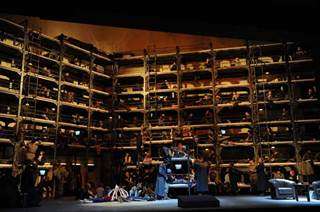|
Back
Otello, Moor of a Refugee Crisis Berlin
Deutsche Oper
06/08/2019 - & June 14, 20, 2019
Giuseppe Verdi: Otello
Russell Thomas (Otello), Guanqun Yu (Desdemona), George Gagnidze (Iago), Ievgen Orlov (Lodovico), Attilio Glaser (Cassio), Burkhard Ulrich (Rodrigo), Ronnita Miller (Emilia), Byung Gil Kim (Montano), Bryan Murray (Un araldo)
Deutsche Oper Chorus and Children’s Chorus, Jeremy Bines (chorus master), Deutsche Oper Orchestra, Paolo Arrivabeni (conductor)
Andreas Kriegenburg (director), Harald Thor (sets), Andrea Schraad (costumes), Stefan Bolliger (lights), Zenta Haerter (choreography)

(© Barbara Aumüller)
Andreas Kriegenburg’s stark and distracting production of Verdi’s penultimate opera has returned to the Deutsche Oper stage for a discreet revival run of three performances. Having premiered in 2010, its depiction of the opera’s Cyprus setting as a refugee camp for what looks like World War II-era people is now submerged among many similar tropes in stage production, mostly driven by the refugee crisis that emerged in the Levant with the advent of the Arab Spring and subsequent conflicts. Curiously, this crisis never touched Cyprus, and who knows what Kriegenburg was thinking of when he designed the production for its 2010 premiere, before any of these unfortunate international events took place. But Cyprus as a land of refugees is what we have, and Otello’s command seems to do little more than administer them. One wondered why Iago would be so aggrieved at being excluded from its petty bureaucratic administration. And at times the concept was downright intrusive. Iago’s creed, his aria of malevolence that had no inspiration or parallel in the original Shakespeare play, is delivered to refugee children in the manner of a ghost story. Our focus is drawn to them rather than to Iago, who is revealing his existential ugliness to himself as much as to us. Similarly, Otello’s signature aria of self-pity, “Dio, mi potevi scagliar,” reveals him being petted consolingly by another ragamuffin, utterly vitiating his maudlin personal drama. And to round out the disappointment, the sets are dominating by a multitiered structure of bunks with beige screens that are often quickly pulled over them for little apparent reason.
Russell Thomas has been making progress in the Verdi tenor repertoire, and not without success. Otello, however, seemed just beyond his abilities at this stage. Too forced and too strained, the voice has not quite grown into this most demanding of Verdi parts. The potential is there, however, and future performances may reveal it. George Gagnidze was a fine Iago, snarling, nasty, and in full voice, but at times a bit too subdued by the direction, which strived to imbue him with more subtlety than was probably warranted. The young Chinese soprano Guanqun Yu emerged as the evening’s true star in her stellar performance as Desdemona. Lithe brilliance soared over her colleagues and the orchestra, which Paolo Arrivabeni led with a virtuoso skill that promises much. Ievgen Orlov’s steady Lodovico stood out among the supporting cast. The Deutsche Oper’s chorus stood out as one of the world’s best ensembles. It was just too bad that the drab sets and costumes underserved it so shabbily. After 25 performances, it may be time for the company to consider a new production.
Paul du Quenoy
|